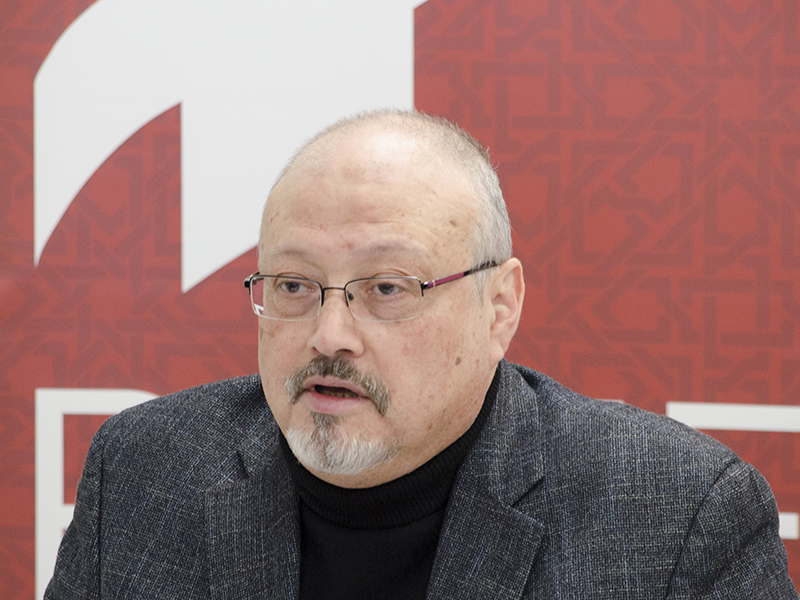The Canadian government’s decision to sanction 17 Saudis in connection with the death of journalist Jamal Khashoggi was applauded by the Raoul Wallenberg Centre for Human Rights (RWCHR).
The Montreal-based RWCHR, which is headed by former justice minister Irwin Cotler, had submitted a list of “at least” 18 Saudi Arabian officials, who it believes there is sufficient evidence to demonstrate their involvement in Khashoggi’s murder, to Foreign Affairs Minister Chrystia Freeland.
Freeland apparently heeded this advice, announcing sanctions against 17 Saudi nationals while attending the G20 summit in Argentina on Nov. 29.
“The murder of Jamal Khashoggi is abhorrent and represents an unconscionable attack on freedom of expression and freedom of the press,” she said.
Cotler applauded the move, saying that, “This is the right action, and timely just ahead of the G20 summit.”
The sanctions were imposed under the Justice for Victims of Corrupt Foreign Officials Act, which imposes a visa ban, freezes any assets in Canada and prohibits Canadian businesses and individuals from having any dealings with those named in the sanctions, said Cotler.
READ: SAUDI ARABIA’S BOTCHED ASSASSINATION
Additionally, the RWCHR is calling for an independent, international inquiry into how Khashoggi died, to ensure that all those implicated are brought to justice, possibly before an international tribunal created for that purpose.
Freeland also supports the idea, saying that, “We continue to call for a credible and independent international investigation. This case is not closed. Those responsible for Mr. Khashoggi’s death must be held to account and must face justice.”
Khashoggi, a Washington Post columnist, was killed after he entered the Saudi Arabian Consulate in Istanbul on Oct. 2.
Cotler said he believes Saudi Arabia was “emboldened” after other democracies failed to stand with Canada when Freeland tweeted in August that she was, “Very alarmed to learn that Samar Badawi, Raif Badawi’s sister, has been imprisoned in Saudi Arabia. Canada stands together with the Badawi family in this difficult time, and we continue to strongly call for the release of both Raif and Samar Badawi.”
The siblings are among more than a dozen people imprisoned around the world that the RWCHR considers political prisoners and on whose behalf it publicly advocates.
Blogger Raif Badawi was jailed in 2012. He had been an outspoken advocate for increased freedoms in Saudi Arabia. His wife, Ensaf Haidar, and their three children live in Sherbrooke, Que.

Samar Badawi, a human rights activist with a focus on women’s rights, was arrested this summer. According to the RWCHR’s information, she is being detained “incommunicado without charges or access to family or a lawyer.”
Freeland’s relatively innocuous social media posting was met with outrage by the Kingdom of Saudi Arabia, which severed diplomatic relations with Canada, suspended trade and cancelled scholarships for thousands of Saudi students attending Canadian universities.
Even among its Western allies, Canada was scolded for meddling in Saudi Arabia’s internal affairs.
“It was an over-the-top reaction,” Cotler said of the Saudis, “but none of the democracies came to the defence of Canada, which I think emboldened the Saudis because the crown prince felt he could act with impunity, even more than after Trump’s visit to Saudi Arabia (in May 2017, his first official trip as president). I draw a direct line to Khashoggi’s murder.”
Cotler praised Freeland for doing a “superb job.”
At the same time, he cautioned against wholly trusting Turkey’s version of events, because it has a woeful record of repressing freedom of the press. “That country has imprisoned more journalists than any other in the world. It should not be given a free pass,” Cotler said.
The murder of Jamal Khashoggi is abhorrent and represents an unconscionable attack on freedom of expression.
– Chrystia Freeland
Cotler said a RWCHR board member, who he preferred not to name, met Crown Prince Mohammad bin Salman in Washington last March. He presented him with a legal brief seeking clemency for Raif Badawi “based on Saudi law and Shariah.
“The crown prince asked questions on how he could release him and not others, noting that Badawi’s father objects and has even called for him to be executed.”
The RWCHR – an independent, non-profit organization that Cotler founded after he left politics in 2015 – has now drawn up a revised clemency appeal that includes both Badawis. Cotler said he hopes it can be presented directly to the crown prince.
The brief concludes that granting clemency to them “is not only consistent with the principles of Shariah and Saudi law, but is mandated by them. The release of Raif and Samar Badawi will resonate positively within Saudi Arabia and across the world, thus protecting and promoting maslaha (community welfare).”
Cotler acknowledges the difficulty in respectfully appealing to a regime for the release of people believed to be unjustly imprisoned and, at the same time, supporting sanctions against those associated with the regime.
He also recognizes that Saudi Arabia is regarded by Israel as a strategic partner in containing Iran’s aggression in the region. Cotler has long lobbied for a tougher international response to Iran.
But Cotler thinks the CIA report that concludes, in his words, that there is “strong reason to believe the crown prince may well have ordered (the killing of Khashoggi) has to be taken seriously.…
“Saudi Arabia itself says those involved must be brought to account. We say there cannot be a compromise when it comes to pursuing international justice.”









